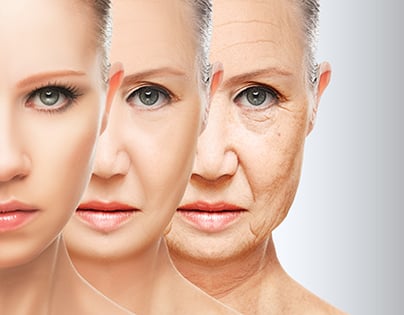Recipes
Skin aging is described as the gradual change in skin appearance and behavior as we age, becoming thinner, drier, with more wrinkles/lines, dark spots, and with less elasticity.

Skin aging occurs in all of us as we age. Some of us see a quicker change in our aging skin and others a slower change. Some of this difference between one person and the next and the speed of the skin aging is due to genetics, but it also can be worsened by a number of lifestyle factors such as:
We can’t stop the aging process completely, but we can slow it down and maintain more youthful, radiant skin to last much longer by taking care of our skin, particularly via a Nutritarian eating style. This includes sufficient healthy fats from nuts and seeds, for example, and high amounts of high-nutrient vegetables and fruits, which are high in antioxidants and other skin-protecting nutrients.
ONLINE: All members of DrFuhrman.com can search the Ask the Doctor archives for discussions on this topic. Platinum and Diamond members can connect with Dr. Fuhrman by posting questions in the forum. Not a member? Join now.
IN PERSON: Book a stay at Dr. Fuhrman’s Eat to Live Retreat in Southern California. With options ranging from one, two and three months (and sometimes longer) you will be under Dr. Fuhrman’s direct medical supervision as you hit the “reset” button on your health. For more information: (949) 432-6295 or info@ETLRetreat.com.
EVENTS: Join Dr. Fuhrman for an online boot camp, detox or other event. During these immersive online events, you’ll attend zoom lectures, follow a special meal plan, and have access to a special, live Q&A session with Dr. Fuhrman. Learn more about events.
The following are sample questions from the Ask the Doctor Community Platinum and higher members can post their health questions directly to Dr. Fuhrman. (All members can browse questions and answers.)
I noticed a couple of tiny brown spots on my calf a couple of years ago. The dermatologist said they are aging spots, and the average 50 year old has about 25 of them, and they will continue to develop.
Are there any foods to slow this down or stop it? Or is it just a normal part of aging?
A Nutritarian diet slows the aging process and protects the skin from skin cancer and premature aging. The only other way to prevent them is to use a non-chemical sunscreen. They appear from cumulative sun exposure. We have searched for non-chemical, non-nano-particle sunscreens for safety and effectiveness that can be used to protect the skin from the sun and make them available here. Of course, wearing long pants and long sleeves and a hat that adequately covers the face and neck are most effective.
Does using sunblock with SPF 30 or 45 eliminate the absorption of Vitamin D from the sun? Does being in the sun to get vitamin D outweigh the skin cancer risk?
Yes, the sunblock reduces the production of vitamin D. Plus, those chemical sunscreens can enter the body and have negative health consequences. I do recommend people take extra Vitamin D as a supplement so they do not have to get too much sun (this increases skin aging, wrinkling, and promotes skin cancer) to assure Vitamin D adequacy. A Nutritarian diet also protects the skin from sun-induced free radical damage.
I read a 2005 article about a small group of women who used 2% progesterone cream on their faces and saw big improvement in sagging/wrinkles.
Any reason not to try this? Is it harmful?
I looked at the study, and while there was improvement in elasticity and firmness in pre- and post-menopausal women, the authors noted that progesterone was well absorbed in the systemic circulation. Over 16 weeks, blood levels rose minimally but statistically significantly. Side effects beyond 16 weeks have not been measured. So, I would be concerned with long term use.
A safer alternative – a small 2009 study looked at the use of oral aloe vera gel and skin aging. After 90 days, those women who took 1/2 or 1 tsp. aloe/day had decreased wrinkling. Of course, not smoking and a Nutritarian diet will be much more powerful at reducing skin aging.